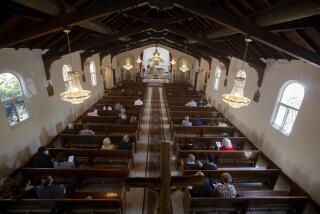TV Finally Finds Religion
- Share via
From the pilgrims to the present, religion has always been an important part of American life. Throughout our history, most Americans have made religious faith a crucial ingredient in their search for fulfillment; they have tried to root their lives in a transcendent ground. When it worked, religious faith enabled them to tap into a source of energy that empowered them to take charge of their lives and exercise their freedom in a responsible way. It supplied the meaning in their lives, helped them discover who they are, choose the values by which they would live and reach out in love to their fellow human beings.
Which may explain why 94% of the American people say they believe in God, why 41% attend church or synagogue on any given weekend, why religious books are perennials on the bestseller lists.
Yet, if religion is central to American culture, it has been curiously absent from broadcast television in the United States. It is not that commercial television has attacked the spiritual dimension of the human personality. It has done what is much worse. It has ignored this most important part of the human psyche.
In doing so, it has shied away from that part of us which is most essentially human, that intimate place where we talk to ourselves and to all those other people who live within us. This is where we do all kinds of important things: fantasize, intuit, create, make commitments, grapple with mystery, struggle for meaning, perceive the sacred, respond to the holy, feel awe and wonder, reach for that which is above and beyond ourselves and enter into communion with the ground of our being.
Freud called this portion of the human personality the unconscious because it is shrouded in mystery and can neither be weighed nor measured. The Greeks called it the soul because it is pre-eminently spiritual. And the Bible calls it heart because it is where love resides and commitments are made.
Yet, for most of its history, American television has acted as if this part of us--let’s call it the human soul--did not exist. “If religion is boring,” asks Howard Rosenberg perceptively, “why is it important to so many people?” (“TV Needs Its Own Contract With America,” Calendar, Nov. 21). And if it is so important, why hasn’t it been reflected in our televised entertainment? Why until recently has God been taboo in prime time?
Is it because, as some critics have maintained, the people of the entertainment community are more stridently secular, less godly than the rest of the country? (Could anyone who lives in this community and knows its people responsibly maintain that?)
Is it because the human soul and the God in whose image it is made are mysteries. We can grasp much about them. But we cannot grasp everything about them. Nor can we program them. Are they just too much for our boxed-in minds to handle?
Is it because many people, in the entertainment community as well as in the viewing public, have confused God with their own super egos, pushing the tenderness and compassion of God into eclipse, leaving only a vindicative and fearsome tyrant that has nothing in common with the God of the Old and New Testaments?
Is it a feeling that entertainment is escapist and spiritual experience is concerned with the realest of the real and that the two, like oil and water, do not mix?
Is it a reluctance, born of spiritual sensitivity to take God’s name in vain, to involve Him in the selling of soap?
*
There are no easy answers to these questions. But I do think there are now indications the old walls may be coming down. The times, they are a-changin’. Many contemporary series, especially those in the hour category, are delving into the hunger of their characters for spiritual connectedness and they are dramatizing their search for a transcendent ground and a spiritual center.
And they are discovering what Sophocles and Aeschylus, Shakespeare and George Bernard Shaw, Robert Bolt and Paddy Chayefsky learned before them: The search for God is the great drama of every human life; and because it is, stories that chronicle that search are intensely involving. They speak to us on some deep level and activate things inside of us that we did not know existed. Jeopardy, surprise, humor, high stakes, emotional accessibility--these stories have it all. Which is just another way of saying: There is nothing more exciting, more theatrical than God.
Why? Because God is the loving mystery in whom we live and move and have our being. More than that, God is the beginning and the end, the meaning, the purpose, the ground and the horizon of all human life.
More to Read
Sign up for our Book Club newsletter
Get the latest news, events and more from the Los Angeles Times Book Club, and help us get L.A. reading and talking.
You may occasionally receive promotional content from the Los Angeles Times.









